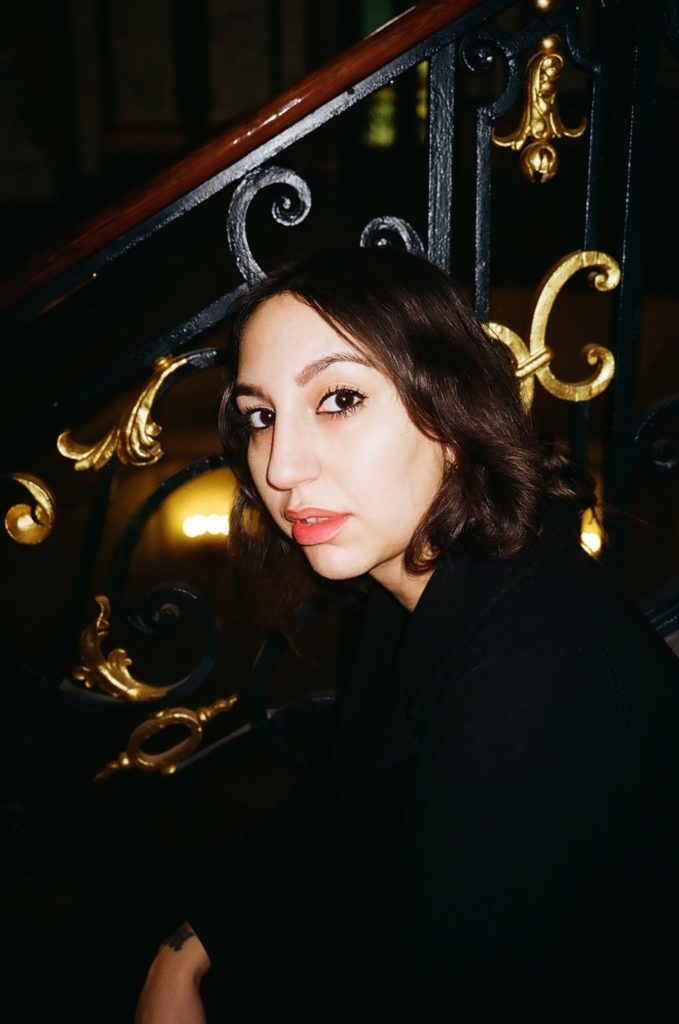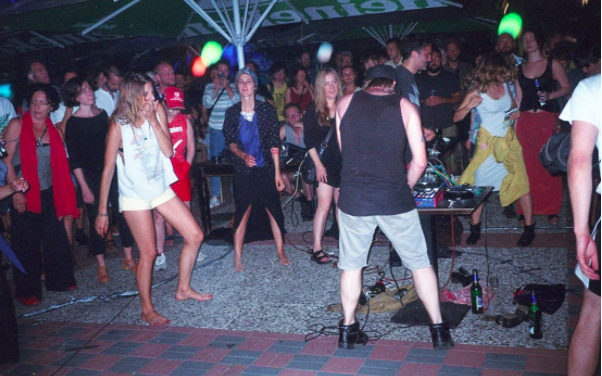

Marta De Pascalis is an Italian musician and sound designer living in Berlin. Her solo works employ analog synthesis and tape loops, incorporating free playing into steady, repetitive patterns. She has produced two albums of minimal synth excursions: the self- released Quitratue (2014) and Anzar (The Tapeworm, 2016) and Her Core in spring 2018 on The Wormhole. Marta creates densely layered collages of glowing melodic shards and growling bass lines, hypnotic synth figures that warp and whirl around each other before dissolving into entropic oblivion. For her compositions, she uses improvisation on a tape-loop system, in which patterns of repetition create a sense of dense, dynamic and cathartic distance.
Hi Marta, how are you doing and where are you right now?
I’m in Berlin, where I have lived for almost nine years. Well, I’m good, but it was hard when I started to realise that I wouldn’t play live for a long time. I was looking forward to all the gigs I had planned, especially the Urvakan Festival in Armenia. But I mean…I, and probably everybody who is reading this feature now, are surely much more privileged than the many people who are living in a war-torn country, trying to seek asylum at some border, have no shelter, no food, no rights at all, and are struggling with things we take for granted every day, even in these difficult times – even if jobs have been lost, gigs cancelled, freedom to travel limited. Considering this, I wouldn’t really dare to complain.
I’m interested in your creative process – do you have a daily routine, and what creative activities count as “work” for you (listening to other music, sounds, experimenting with techniques, research, etc)?
Yeah, there are things I do constantly but not really with a routine frequency – in fact I kinda hate routines, the idea of them makes me feel trapped somehow. I see ‘work’ more like everything that relates to gigs – rehearsing, travelling, performing. Listening to music, writing, reading, practising piano, and going regularly to the studio are activities I consider part of my research and things I love to occupy my time with. The idea of work is a bit dangerous and damaged. We should reappropriate our time and our actions and rethink them out of the devouring force of the capitalist work dogma. Now is the perfect time to try to do this.
“…sounds are constantly ‘falling’ from the source, landing gently and staying on the tape’s surface”, you said in an interview. This notion of sounds falling is interesting. Can you elaborate?
I was talking about the piece ‘Anzar’, released in 2016 on The Tapeworm, and referring to how the piece was built. It appears to me that sounds follow a special imaginary trajectory: a sound can fall in the sense that it draws a certain geometry in space. I see that piece as a sort of sonic cascade – Anzar means rain, and in fact with the title, I wanted to hint at a particular sound direction to orient within it. The material recorded for the next LP moves instead across other directions. More horizontal. Or oblique, probably! I haven’t thought about it in these terms so far, to be honest, it’s a record built around a different poetry.
You talk about the lack of a centre. The centre of a cycle, the centre of a tape.
I have been intrigued by the concept of the lack of a centre in many ways. First of all, it’s a kind of personal mantra I use when I am involved with some negative thoughts – this is not the centre, I try to repeat to myself. It’s also a good exercise to hold off the ego: in the infinite universe, nobody is the centre of anything. Also, tape loops involve a similar approach – there is never a central phrase, it’s the constant evolving of a structure, a cycle of musical events that always shifts its coordinates. I was also quoting ‘The Overload’ by Talking Heads: ‘A view to remember / The center is missing / They question how the future lies /…in someone’s eyes / The gentle collapsing / Of every surface / We travel on the quiet road / / …the overload’
I was (still am, even if I actually haven’t listened to it for a long time) very fascinated by that album, by the way in which Talking Heads were masterfully able to blend different genres, the great production job done by Eno, the brilliant contribution of Jon Hassel’s unique sound, and I felt that the lyrics of that piece connected to what I was doing back at that time.
The loop has infiniteness tied to it. Something without a beginning and end. The loop has a long history in electronic music – tape manipulations were some of the early creative tools for experimental musicians. Can you talk about the importance of the loop in your work?
I like tape looping as it creates an interesting dialogue between machines, and allows me to play within composition intention and chance. Loops and sound patterns are also good tools for building up intense layers of sounds and harmonies, and I find tape machines’ sound deterioration very fascinating because it can be related to many things – hauntology for example, memory, decay – themes I found myself facing in the city in which I was born and lived for most of my life, Rome, a place littered with ruins. These visions have inspired my recent music a lot. Speaking of other musicians working with tapes and loops, I especially love Terry Riley, Aaron Dilloway and Boards of Canada; they’ve been using tapes in a very different way and they have all had a big influence on what I do. Anyway, my music is mostly loop-based but not only – the upcoming record presents various techniques I messed with. I don’t like to fossilise too much, digging a special practice is good and so is jumping into something new and challenging, that’s the basis and the fun of experimental music.
Can you talk about your curatorial work?
Together with Sara Koohestanian, (Fillipp Vingerhoets joined us from the second edition on), I am the founder of Marina Di Neukölln, an independent music festival which takes place in Berlin during summer, in the garden of a Turkish restaurant. Sara and I were sharing a rehearsal room very close to that place and we were fantasising about putting on shows there as it is a bizarre and cosy open air venue and it has a kind of Mediterranean summer feeling. You know, plastic chairs, a sky roof, cheap drinks, food. Simple things! But difficult to find in the obscure world of Berlin clubs and cold industrial music venues. And I was also interested in creating a bridge between musicians who don’t usually share a stage, enhancing the kaleidoscopic aspect that this city offers so well in the variety of its music communities.
So, we ended up crafting a festival that put together old and new rising stars from different Berlin underground music scenes. The result was incredibly successful, really amazing. It’s like we supplied something that was missing. The place unfortunately closed last winter, due to the massive intervention of corporations who bought the entire area and who are forcing people to leave. Very sad – we are thinking about something for the future, but that place was unique, hard to replace.

You performed at an event called “The Italian New Wave”. Do you feel connected to the current electronic scene in Italy?
I think that in order to be part of a scene you need to be present there, attend the same venues, jam together, contribute to the music reality of a certain place. In that sense, I am closer to the electronic scene here in Berlin rather than the one in Italy. I do feel connected to some musicians and producers spread around the world though – I guess because we share a similar approach to sound and poetry. But sure – I am an Italian musician, I take a lot of inspiration from the world of early experimental Italian electronic music, and I’d like my effort to be seen as a continuation of what was done back then.
You have a new release coming up. Could you speak about it?
Yes, I have a new LP coming up soon on Rabih Beaini’s Morphine Records. It was recorded in Rotterdam at Worm Studio and in Berlin – in my studio and at Big Snuff – between 2019 and 2020. I’m very much looking forward to sharing it, it was a very intense journey to achieve the sound I had in mind. And even though I’ll have to wait to perform it live, it doesn’t really matter: music don’t stop.
Interview by Lucia Udvardyova